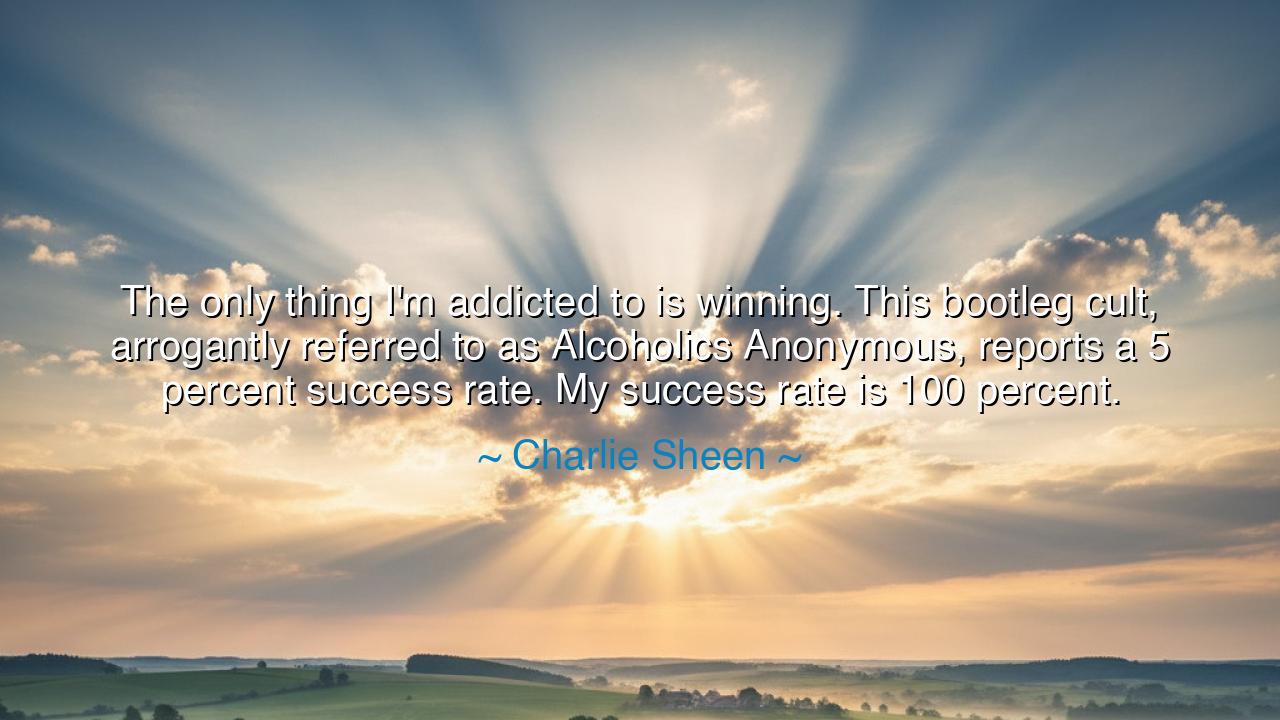
The only thing I'm addicted to is winning. This bootleg cult
The only thing I'm addicted to is winning. This bootleg cult, arrogantly referred to as Alcoholics Anonymous, reports a 5 percent success rate. My success rate is 100 percent.






"The only thing I’m addicted to is winning. This bootleg cult, arrogantly referred to as Alcoholics Anonymous, reports a 5 percent success rate. My success rate is 100 percent." Thus thundered Charlie Sheen, in a moment both defiant and raw, speaking words that blaze with the fire of self-belief, yet also carry the shadow of struggle. His cry is not merely arrogance—it is the declaration of a man at war with his own demons, a warrior who refuses to admit defeat, even when the battlefield is within himself.
The origin of these words lies in Sheen’s battle with addiction, fame, and the gaze of the world. In rejecting the path of Alcoholics Anonymous, he sets himself apart, boasting of his own way, his own discipline, his own will. Whether true or not, the statement reveals a deeper truth of the human spirit: the desperate hunger for victory, the refusal to see oneself as broken, the unyielding desire to be defined not by weakness but by winning. It is the ancient instinct of man to conquer—whether he fights enemies on the field, or the cravings of his own body.
The ancients knew this spirit well. Alexander the Great declared there were no more worlds to conquer, yet his hunger burned still. Caesar boasted that he came, he saw, he conquered. In every age, men have measured themselves not by their wounds, but by their victories. Sheen’s words echo this heroic, if dangerous, tradition: to exalt winning above all else, to claim perfection, to say, my rate is 100 percent. Yet behind such words lies the paradox—no mortal man can always win, and those who claim it often mask wounds too deep to reveal.
Consider the tale of Achilles. He was invincible in body, but vulnerable in spirit, driven by rage and pride. He boasted of his success, and in battle it was true—none could stand before him. Yet even he, the mightiest of warriors, bore the hidden weakness that would bring him down. So it is with Sheen’s declaration: it is the boast of Achilles, both glorious and tragic, both inspiring and foreboding. For in claiming to be addicted only to winning, he reveals the terror of admitting defeat.
The meaning, then, is layered. On the surface, it is bravado, the anthem of self-belief. But beneath, it is the cry of one who will not surrender to shame. To Sheen, the cult of recovery appeared weak, slow, and uncertain, with its low rates of triumph. So he turned to the language of absolutes, claiming a success beyond doubt. Yet in truth, the ancients would caution us: no man who denies his weakness can ever truly master it. True winning is not the absence of loss, but the courage to face it, to rise from it, and to be transformed by it.
The lesson for us is not to mock or dismiss his words, but to learn from them. Confidence is power; without belief, no man can endure the storms of life. Yet arrogance without humility is a house without foundation—it will crumble when the winds grow strong. To say “I am addicted to winning” is noble if it means discipline, persistence, and faith. But if it blinds the heart to weakness, it becomes the seed of downfall. The ancients teach balance: to seek victory, but also to learn from defeat.
Practical wisdom calls us to action: cultivate the spirit of the victor, but temper it with truth. When you triumph, do not boast as though you are invincible. When you fail, do not despair as though you are worthless. Instead, bind yourself to the deeper law: that success is found not in never falling, but in rising every time you fall. Walk with confidence, but walk also with humility, for both are needed if your victories are to endure.
Therefore, children of tomorrow, hear Sheen’s fiery words and take from them both inspiration and warning. Be fearless in pursuit of winning, but be wise enough to know that true victory is not measured in boasts of “100 percent.” It is measured in perseverance, in courage, in the willingness to face your demons and still rise. For the man who knows both triumph and defeat, yet walks forward unbroken, is the one who truly embodies eternal success.






AAdministratorAdministrator
Welcome, honored guests. Please leave a comment, we will respond soon